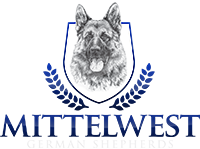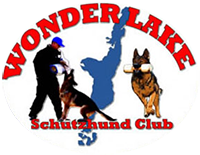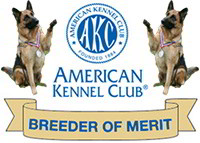Figuring out how often to feed your German Shepherd puppies might feel like walking a tightrope. But don’t worry—a solid feeding schedule is your safety net. It’ll keep your pup growing strong and full of energy as they hit all those exciting milestones.
Want to nail down the perfect feeding plan for your GSD? Keep reading to find out the must-know tips for feeding them at every stage of their growth. We’ll cover common mistakes, what could go wrong, and how to steer clear of trouble. Plus, discover why having your breeder’s support can make a huge difference in raising a happy, healthy puppy.

What German Shepherds Need To Grow Big & Strong
GSD puppies grow like weeds in their first few months, so good nutrition is essential for their health. Each growth stage comes with its own dietary needs to keep them on track as they develop. Proper feeding fuels their rapid growth and sets the stage for a lifetime of vitality and strength.
Newborn To Four Weeks
For the first few weeks, newborn puppies rely on their mom’s milk or a top-notch puppy formula. You must feed them every 2 to 3 hours to fuel their fast growth and high energy needs. This constant feeding helps keep their body temperature steady and supports crucial organ development.
These frequent feedings are packed with proteins, fats, and vitamins essential for building muscle, boosting their immune system, and overall growth. Getting their nutrition right now sets them up for a healthy future.
Four To Eight Weeks
During this stage, puppies are ready to switch from milk to solid food. Introduce a high-quality, easy-to-digest puppy food to meet their growing needs. Feed them four times daily to keep up with their expanding appetites and support their energy levels.
The new food should include proteins for muscle growth, fats for energy, and vitamins for overall health. Regular feedings during this transition help puppies get used to solid food and ensure they get the nutrients they need to keep growing strong.
Eight Weeks To Six Months
As your German Shepherd puppy grows, it’s time to cut back their feeding to three times a day. This change lines up with their shifting metabolism and lower energy needs. Keep an eye on their growth and tweak portion sizes as needed to keep up with their appetite and energy levels.
Stick with a diet packed with proteins for muscle growth, fats for energy, and minerals for strong bones. With the proper portion control, you’ll make sure they’re getting all the nutrients they need to grow steadily without overdoing it.
Six To 12 Months
When your pet hits six months, it’s time to switch to feeding them twice a day, just like the grown-ups. This helps them get used to an adult diet and sets up good eating habits for the future. Make sure their portions are spot-on to meet their growing needs.
Stick to a balanced diet with enough proteins for muscle maintenance, fats for energy, and minerals for strong bones. Adjust their portions based on how active they are and their body condition to keep them at a healthy weight and support their ongoing development.
A solid feeding schedule is key to keeping your German Shepherd healthy and happy. A good routine ensures they get the right nutrients, helps manage their appetite, and supports their growth. Further, a well-planned schedule can make training easier and smooth their transition into adulthood.
Crafting The Perfect Feeding Schedule
A solid feeding plan is crucial for keeping your German Shepherd happy and healthy. A well-thought-out schedule boosts the overall well-being and behavior of dogs. Here’s how to nail down the perfect feeding schedule for your growing pup.
Sticking To A Routine
A regular feeding schedule sets up a predictable routine that helps reduce anxiety and makes your puppy feel secure. Feeding them at the same times each day ensures they get the right amount of food when they need it. This practice supports good digestion and keeps their energy levels steady.
Consistency in feeding also plays a big part in house training, syncing up with bathroom breaks, and managing feeding-related behaviors. This structured approach helps your puppy develop good habits. Additionally, it makes training and behavior management a whole lot easier.
Portion Control & Timing
Getting portion control right means sticking to the feeding guidelines on your puppy food package and tweaking amounts based on your pup’s growth, weight, and energy levels. This keeps you from overfeeding or underfeeding, which is super important.
Keep a close eye on your puppy’s weight and adjust their food intake as needed. Avoid common feeding mistakes that can lead to long-term health issues and impact their overall well-being. You’ll help your puppy thrive and grow into a healthy adult with the right portion control and timing.
Common Feeding Mistakes To Avoid
Feeding your German Shepherd puppy right is key to their health and growth, but with all the mixed advice out there, it’s easy to slip up. Steer clear of these common feeding blunders to make sure your pup grows into a strong, healthy adult. Here’s what to watch out for:
Overfeeding
It’s hard to resist those adorable, pleading eyes, but overfeeding can lead to obesity and health issues down the road. Stick to the recommended portions to avoid straining their growing joints and organs. Always measure their food based on the guidelines from your puppy food brand and adjust as needed for their growth and activity level.
Choosing The Wrong Food
Not all puppy foods are created equal. Picking the wrong type or brand can affect your puppy’s health and development. Go for high-quality, nutritionally balanced food that meets their specific needs. Avoid foods with fillers or artificial additives, which can cause allergies or digestive problems.
Chat with your vet to make sure you’re feeding your pup a diet that fuels their growth and energy. While doing this, you’re setting them up for a lifetime of good health. A little extra care now means a healthier, happier dog in the future.
Transitioning Too Early
Switching your puppy from puppy food to adult food too soon can mess with their digestive system and stunt their growth. Puppies need different nutrients than adults, and jumping the gun can cause deficiencies or imbalances.
Taking your time with the transition is key. A gradual switch to adult food helps your puppy’s tummy adjust without any drama, ensuring they get the right nutrients at every stage of their development. This smooth transition supports their health and keeps their nutrition balanced as they grow.
Moving From Puppy To Adult Food
Switching from puppy food to adult food is crucial for keeping your dog healthy as they mature. Usually, this change is needed around 12 months of age, when your puppy’s growth rate slows, and they reach physical maturity. Consult your vet to determine the best time for your pup based on their unique development and health.
To make the transition smooth, start by mixing a small amount of high-quality adult dog food with their current puppy food. Gradually increase the adult food ratio over 7 to 10 days while decreasing the puppy food. This gradual shift helps your pup’s digestive system adjust and prevents tummy troubles.
This is why it’s smart to adopt from a top-notch breeder. Reputable breeders really know their stuff when it comes to German Shepherds and their unique needs. They offer expert advice on everything from nutrition to health care and training, giving you a solid start with your new pup.
Get To Know Your Puppy’s Needs with Mittelwest
At Mittelwest, we’re all about raising top-notch German Shepherds and setting you up for success. We’re here to give you the best start for a happy, healthy dog. We understand how crucial proper nutrition and feeding schedules are for your puppy’s growth and development.

As experts in German Shepherds, we’re ready to share our knowledge on everything you need to know. When you adopt from us, you get our ongoing support beyond the initial purchase. This approach ensures a smooth start and a thriving future for your new furry family member.
We’re dedicated to helping you raise a strong, healthy, and well-adjusted GSD. Additionally, we guide you through essential things you need to know about your pet. We offer advice on everything from choosing the right diet to managing their transition into adulthood. Reach out today and let us make your GSD ownership experience exceptional.
Summary
GSDs need the proper nutrition to keep up with their fast growth and development. From their early weeks to adulthood, each stage of their life demands specific dietary tweaks. Watch out for common pitfalls like overfeeding, choosing the wrong food, and transitioning too soon.
Choosing a dog from a reputable breeder makes a big difference. At Mittelwest, we’re here to support you beyond just the initial adoption. We offer ongoing advice on everything from the best diet and feeding schedules to how these choices impact your dog’s well-being.












